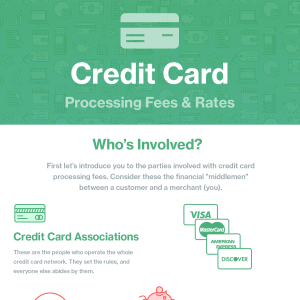Cost isn't the only thing you should consider when choosing a merchant service provider. Here's what to look for before signing up.
We’ve identified seven different features that you need to look at very carefully when selecting a merchant services provider to accept credit cards at your business. They’re all equally important, and you’ll want to examine each of them when evaluating any merchant account provider you’re thinking of signing up with.
7 Things To Look For In A Merchant Service Provider
In addition to providing a merchant account, merchant services providers also include a variety of products and services that you’ll need to accept credit card payments, such as credit card terminals, mobile credit card readers, point-of-sale (POS) systems, and more.
Here are the most important considerations when choosing an MSP.
1. Hardware
No matter what kind of business you run, you’ll need equipment to process your sales. Even a purely eCommerce venture is still going to need some hardware – even if it’s just your laptop. For most other businesses, however, your hardware needs will be more extensive.
Mobile Readers
Options for reading credit cards are more robust today than they were just a few years ago. In addition to the traditional wired credit card terminals commonly seen in retail establishments, there are now numerous wireless terminals and mobile processing systems that combine a smartphone with a basic mobile credit card reader to offer the same capabilities as a dedicated terminal.
Wired Terminals
Wired credit card terminals are still the most commonly used card readers out there, and they offer several distinct advantages. Perhaps most importantly, they’re simply more reliable. You don’t have to worry about your wireless internet connection suddenly going down and leaving you unable to process a sale. Wired terminals are also generally better at supporting newer features such as contactless payments using near-field communications (NFC), such as Apple Pay, Samsung Pay, and others.
Today, wired terminals are more affordable than ever, and we highly recommend that you buy your terminals outright rather than leasing them from your merchant account provider.
POS Systems
While a modern POS system is ultimately a software solution, the hardware required to input and display the data involved can vary from a dedicated terminal (such as Clover) to a tablet-based system that runs on your iPad or Android tablet. For most small businesses, we recommend a cloud-based POS rather than a far more expensive legacy POS solution.
See our best small business POS article for more specific recommendations.
2. Software
The days of tracking your sales in a paper ledger and collecting a shoebox full of sales receipts are, thankfully, long gone. Today’s merchant accounts harness the power of the internet to track and store your account data digitally. Cloud-based systems make that data available just about anywhere, on any internet-connected device. Physical and eCommerce businesses alike will need the appropriate software to take advantage of these capabilities.
Virtual Terminal
If your business operates out of a physical location and you don’t make any sales online, your needs will be pretty simple. One useful product to consider is a virtual terminal. This is simply a software program or web service that allows you to process credit card transactions on your computer using a USB card swiper. Most will also grant you the option of keying in a card manually, which can be handy during hardware malfunctions or in cases where you need to take a card over the phone.
Payment Gateway
eCommerce merchants will have more extensive needs in order to run their virtual businesses. For online sales, you’ll have to have a payment gateway as part of your merchant account. Payment gateways connect customers wanting to make a payment with the bank or merchant account provider that processes the transaction. Most merchant account providers in business today will offer a payment gateway as part of their services, usually through Authorize.Net.
Shopping Cart
For eCommerce merchants, an online shopping cart that allows customers to select items and place orders is also essential. Shopping carts integrate directly into your website rather than functioning as a stand-alone feature. Shopify, one of our favorites, is perhaps the most well-known online shopping cart.
POS Software
Point-of-sale (POS) software will be important for most in-person businesses. POS combines transaction processing with database capabilities, allowing you to track not only sales, but also inventory, customer relations, employee performance, and numerous other metrics. Modern POS systems truly bring “big data” concepts to small and not-so-small businesses.
3. Merchant Account Fees
In evaluating any merchant account provider, you’ll want to look for a fee structure that is both reasonable and transparent. For our purposes, a reasonable fee is one where the account provider actually provides a valuable service in exchange for that fee. Fees should also be transparent or fully disclosed before you sign up for an account.
While the best credit card processors generally disclose their merchant account fees on their website, most traditional processors do not. Instead, they’re buried in pages of fine print and often not disclosed by sales agents.
So, what kinds of fees might you be charged? Here’s a brief overview of common fees associated with merchant accounts:
Common Merchant Account Fees
- Account Setup Or Application Fees: You don’t see these as often as you used to, but some merchant service providers charge a one-time setup fee when you begin the service. Usually running around $150 (!), a setup or application fee is a clear red flag that you should avoid doing business with that account provider. The actual amount of labor required to set up your account is minimal; this is just a bonus haul for the MSP.
- Monthly Or Annual Account Fees: Almost all providers – good and bad alike – charge some sort of fee to maintain your account. This might be billed monthly, or charged as an annual fee. Either way, it’s something of a catch-all charge to cover all the things your account provider isn’t charging you for directly. This can include things like PCI compliance scans, “free” credit card terminals, “free” virtual terminals, and other services that come with your merchant account. What constitutes a reasonable account fee depends on how many services come with your account and whether or not you actually need them.
- Monthly Minimums: Not a fee in itself, a monthly minimum is a requirement that your business process a sufficient total amount in transactions to incur at least a specified amount (typically $25) in processing charges. As a hypothetical example, if all of your transactions were charged a flat 2.0% processing rate, you’d have to process $1,250 in total sales to meet the $25 minimum. You only have to pay if you fail to meet the minimum, and even then you only pay the difference between your actual processing charges and the amount specified as the monthly minimum. While they won’t affect a large, established business, they function as a penalty for very small, part-time, and seasonal businesses. If you fall into that category, you’ll want to avoid any provider that includes a monthly minimum in their contracts.
- PCI Compliance Fees: Your merchant account must comply with the Payment Card Industry Data Security Standard (PCI DSS) security standards. This protects both you and your customers who, after all, are entrusting you with their credit card information. PCI compliance fees are a reasonable cost of doing business as long as a) your provider is doing PCI scans and taking other steps to protect your account and your customers’ data, and b) the fee is reasonable ($99 per year is the current industry average). On the other hand, you should never have to pay PCI non-compliance fees. If your provider can’t keep you compliant, find another provider. Also note that some of the newer providers do not charge a discreet PCI compliance fee. In most cases, you’re still paying for this as part of your monthly or annual account fee.
- Statement Fees & Other “Junk” Fees: Traditional merchant account providers are notorious for adding any number of miscellaneous fees to your monthly bill, often with little or no actual service provided to you in exchange. While most of these fees are pretty minor and won’t add much to your costs, things like statement fees can add up quickly.
- Early Termination Fees: Most of the traditional merchant account providers in the industry will sign you up for a long-term contract (typically three years), and will charge you an early termination fee (ETF) if you try to close your account early – for any reason. ETFs are expensive (typically around $495) and are designed to discourage you from switching your account to a different processor. Luckily, this fee is avoidable if you select the right service. None of our favorite processors charge an ETF, allowing you to maintain your account on a month-to-month basis with no penalty for closing it.
- Chargebacks: Any time your processor has to reverse a charge and issue a credit, you’ll be hit with a chargeback. Chargebacks can occur due to technical errors, returned merchandise, or actual fraud. Even though you as the merchant probably haven’t done anything wrong, most processors will still charge you a chargeback fee (typically about $20) to investigate what happened and issue a refund. For more information, see our article on avoiding chargebacks.
4. Processing Fees
Processing rates can be very complicated and confusing, especially since the processor only keeps a portion of whatever they charge you. How credit card processing works is that fees (called the interchange) have to be paid to the credit card association (i.e., Visa, Mastercard, etc.) and also to the bank that issued the card, with the remainder going to the processor. Companies have devised several different pricing models to pass these costs onto you, including interchange-plus, tiered, and flat-rate pricing.
So with so many different processing models, how can you tell a good processing rate from a bad one?
The most common way is to use something called the effective rate. You can learn more about the different processing models and how to calculate your effective rate below.
Interchange-Plus Pricing
As its name would suggest, the interchange-plus pricing model consists of an “interchange” and a “plus.” As we’ve noted, the interchange is paid to the issuing bank and also the credit card association. The “plus” is simply the amount that your processor keeps from each transaction. Interchange-plus rate quotes are often expressed as “interchange + X %,” with the X % being the “plus.” Some processors also charge a fixed per-transaction fee (typically $0.10 to $0.25) as part of the “plus.” Because you can easily see exactly how much your processor is keeping from each transaction, it’s considered the most fair and transparent pricing model. It’s also usually, though not always, less expensive overall than tiered or flat-rate pricing.
Tiered Pricing
The tiered pricing model consolidates dozens of different processing rates into three tiers: qualified, mid-qualified, and non-qualified transactions. Which tier a transaction will fall into depends on several variables, such as whether the card was swiped or manually entered, what the items purchased were, when the transaction was sent to the processor, and many others. Companies offering tiered pricing often only advertise their qualified rates, with phrases like “rates as low as…” In reality, most transactions will fall into the mid-qualified or non-qualified categories, where the rates are almost always much higher. It’s usually best to avoid providers that use tiered pricing.
Flat-Rate Pricing
eCommerce-focused companies, such as Square and PayPal, offer flat-rate pricing as an alternative to traditional pricing models. Each transaction is charged a flat percentage rate and often a fixed per-transaction fee as well. Rates are simple, easy to understand, and fully disclosed right on the companies’ websites. Flat rates are usually higher than what you’ll get with interchange-plus pricing, but companies that offer them also charge you a lot less in monthly and annual fees.
Effective Rate
The effective rate is your total processing fees divided by your total sales volume, with the result expressed as a percentage. If you currently have a merchant account, you should be able to find all the necessary information on your monthly statement.
We estimate that a “good” rate falls somewhere between 3-4%, although you shouldn’t necessarily panic if it’s slightly higher than that. If you’re a high-risk merchant, for example, you should expect to pay higher rates.
5. Marketing & Advertising
Online advertising has now become the single most important way to market any business, including merchant account providers. A website can tell you a lot about a company, both good and bad. Unfortunately, most merchant account providers have very poor websites.
Filled with misleading advertising gimmicks and lacking any sort of educational information, they frequently tease you with claims of low processing rates, while failing to disclose any of the actual rates or fees you’ll be paying.
You’ll know that you’re dealing with a good, ethical company if their website includes some (or all) of the following features:
- Full disclosure of processing rates and all monthly and annual account fees
- Educational articles that discuss the details of credit card processing
- A detailed knowledge base for customer self-service
- Clear options for contacting customer service (telephone, email, and chat)
- No misleading low rate claims or “lowest rate guarantee” gimmicks
- Positive testimonials from actual merchants, including full personal and business names
As far as agents go, you’ll want to try to work with an MSP with in-house sales staff rather than independent contractors who work purely on commission. The latter tend to have less industry knowledge and are over-incentivized to make a sale, even if it results in a bad business relationship.
6. Contract Length
The credit card processing industry has a terrible (and well-deserved) reputation when it comes to contracts. Signing up for a merchant account typically locks you into a long-term contract, usually for three years.
If that wasn’t bad enough, most contracts also include an automatic renewal clause that will extend your contract for an additional year if you don’t take very specific steps to cancel it ahead of time. Most processors will also include an early termination fee in your contract, which serves as a penalty (typically around $495) for terminating your contract early.
Some of the worst processors will even include a liquidated damages clause in their contracts, which could potentially cost you even more money if you try to get out of your contract.
Naturally, these one-sided contract provisions have generated a huge number of complaints from merchants over the years. Fortunately, the industry is responding in a positive way, albeit very slowly. Most of our highest-rated processors will allow you to sign up for an account on a month-to-month basis. There’s no long-term contract, no early termination fee, and no liquidated damages clause. Given a choice between the two, there’s simply no reason whatsoever to sign up for anything other than a month-to-month account.
7. Customer Service & Support
Service after the sale is just as important for merchant accounts as it is for anything else – maybe more so. Things can and will go wrong. Credit card terminals will suddenly stop working on a busy day. Mysterious, unexplained charges will show up on your statement. Chargebacks will occur, despite your best efforts to prevent them.
For all of these and many other possible issues, you’ll want solid customer service and support from your merchant account provider.
For minor issues, self-service should always be an option. Good providers maintain extensive FAQs and knowledgebases on their websites, allowing you to fix a problem on your own. This is particularly handy during non-business hours.
Most processors (even the bad ones) offer support via telephone or email. Chat support through the company’s website is also becoming more common. Telephone support that’s available 24 hours a day, seven days a week, and 365 days a year is ideal. Be aware that many companies offering 24/7 telephone support outsource that function, so you might end up talking to someone who may or may not be able to resolve your problem.
Some companies will assign you a dedicated account representative, which is about the most personalized support you can hope for.
Questions To Ask Merchant Credit Card Processors
Now that you’ve got an idea of what to look for in advance, you can formulate some useful questions to ask your prospective MSP before you sign up. Here are some good questions to ask:
- What Are Your Replacement Times For Hardware? You’ll want to know what kind of downtime you’re looking at when your hardware needs to be replaced or upgraded.
- Are There Processing Limits? Just like there can be minimum processing thresholds, MSPs may have limits on the amounts you can process. These limits are usually expressed as a proportion, i.e., $1,000/$5,000, which would have a limit of $1,000 per transaction and $5,000 per month.
- What Are Your Funding Times? You aren’t getting a merchant account for the fun pricing systems, so you probably want to know how long they’re going to hold the funds from your card sales before releasing them to you.
- What Are Your Batch Times? This ties into the previous question since time-to-funding begins when you submit your batch, so you’ll want to know when your sales are being transmitted.
In addition to asking these important questions, you may even be able to negotiate lower credit card fees during the signup process.
The Bottom Line On How To Choose A Merchant Service Provider
Now that you know more about what to look for in a merchant services provider, let’s wrap up. If you’re just starting out or your business is never going to be anything more than a side gig, you might not need a full-service merchant account. Low-cost providers such as Square will allow you to process credit cards without having to pay for many of the bells and whistles that come with a true merchant account.
However, larger businesses will need a full-service merchant account for the security features and robust customer service that come with it.
Despite all the unscrupulous practices in the processing industry, there are some good merchant services companies out there. Check out the best credit card processing companies that offer high-quality service at a fair, reasonable cost.













